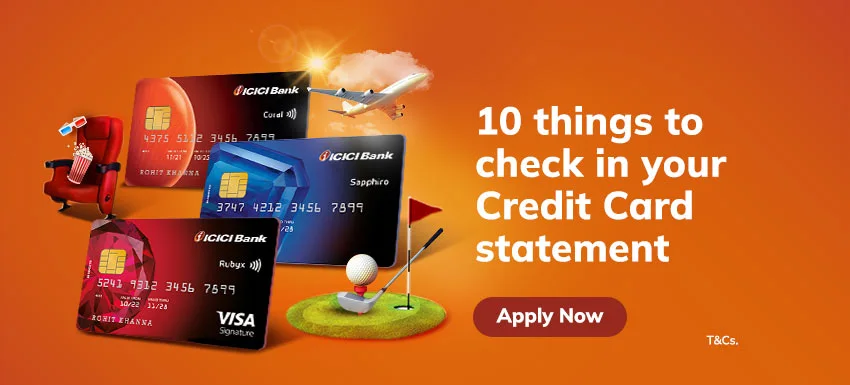THE
ORANGE
HUB
10 Things To Check In Your Credit Card Statement

Credit Card users often focus on the total amount due, but did you know there's a wealth of information in your Credit Card statement that can significantly impact your financial standing?
Discovering the ins and outs when you download your Credit Card statement is more than just keeping tabs on the total amount due. A whole world of essential details can significantly impact your financial well-being. This blog will explore ten essential elements beyond the basics, like your name and transactions.
Demystify your Credit Card statement, make savvy financial choices and take charge of your credit story.
Things to check in your Credit Card statement:
1. Statement date
Understanding your statement date is like getting the key to your financial diary. It's the beginning of your Credit Card journey for the month. Most importantly, interest will start getting accumulated from this date if you've been late in settling your previous bill. Knowing this can empower you to plan your payments more effectively and avoid unnecessary interest charges.
2. Payment due date
While this is the date the Bank expects to receive your payment, it's crucial to recognise that there might be a time lag between your Credit Card payment and the company receiving it. Factors such as processing times, can impact the actual receipt of your payment. To avoid late fees, paying a few days in advance is prudent. It is especially relevant when using cheque payments, which may take additional time to reflect.
3. Billing cycle
Understanding the 30-day billing cycle is akin to having a financial snapshot of your month. It encapsulates all your transactions, providing a comprehensive overview of your spending habits. Keeping an eye on your billing cycle can be instrumental in budgeting more effectively. It's not just about paying bills; it's about understanding your financial rhythm.
4. Grace period
The grace period serves as a crucial buffer, post the payment due date. While the Reserve Bank of India (RBI) specifies a three-day window for late payment charges, Credit Card companies often provide a more extended grace period. Knowing this period is essential to avoid late payment charges. Planning your payments within this timeframe ensures a smooth and stress-free financial journey.
5. Transaction details
Your Credit Card statement is a detailed record of your financial activities. It includes important details of your transactions, giving you insights about your spending patterns. Reviewing these details can help you promptly spot discrepancies or unauthorised transactions.
6. Total amount due
The total amount due is not just a number; it's the bottom line of your Credit Card statement. Understanding how this amount is calculated is crucial. It's about your purchases and any carried-over balances, interest or fees. This awareness empowers you to make payments that align with your financial capabilities. It's about taking control of your financial narrative.
7. Minimum amount due
Paying only the minimum amount due might seem like a relief from late fees, but it's a strategy fraught with risks. The minimum amount is typically around 5% of the total due or a fixed minimum amount, whichever is higher. Paying only the minimum amount may waive late fees, but it incurs instant interest on the remaining unpaid amount, leading to a potential debt trap. Prioritise paying the total amount due to maintain control over your finances.
8. Credit limit availability
Your credit limit is not just a number; it's your financial boundary. Knowing how much of your limit is available can prevent unintentional overspending. Keep a close eye on your credit limit, especially if you have a significant outstanding balance. It's about understanding the limits and possibilities of your financial playground.
9. Cash advance
Cash advances can be tempting, but they come with high costs. Understand the fees and interest rates associated with cash withdrawals. Remember the monthly limit and use this feature sparingly to avoid unnecessary financial strain. It's about being aware of the pitfalls and making informed decisions.
10. Reward Points
Many Credit Cards offer Reward Points as a perk. Checking your Reward Point summary helps you track your accumulated points and understand how your spending contributes to these rewards. ICICI Bank Credit Cards offer enticing reward programmes, providing additional value for your transactions. It's not just about spending, but also maximising the benefits of your financial choices.
Conclusion
Your Credit Card statement is more than a bill; it's a powerful financial awareness and control tool. Regularly reviewing these ten elements ensures you stay informed, make strategic financial decisions and ultimately, navigate the world of credit confidently.
Ensure you keep track of your Credit Card statement effortlessly by using online tools like Credit Card login and downloading your Credit Card statement. These tools enhance convenience, allowing you to efficiently stay on top of your finances.
Understanding these elements is not just about being a responsible Credit Card user; but also being the master of your financial destiny. Take control of your financial journey with ICICI Bank Credit Cards and apply today!
Scroll to top












